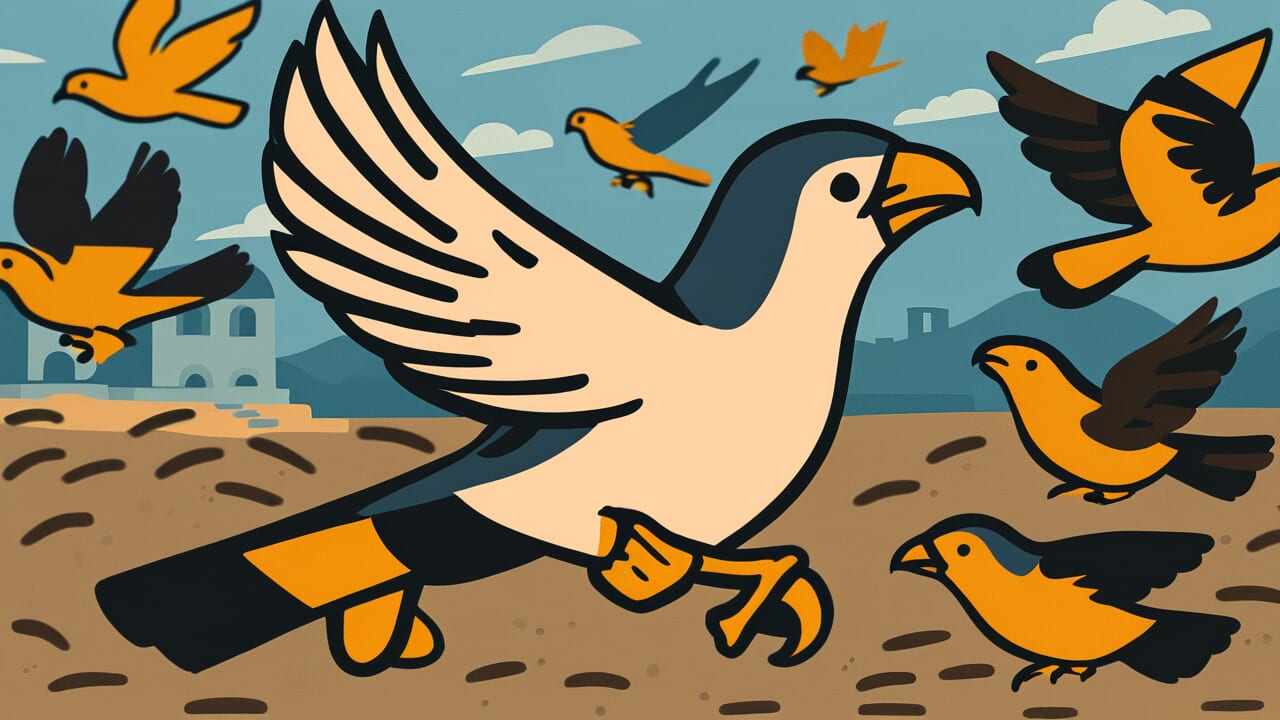How to Read “A thousand sparrows and ten thousand doves become enemies with the hawk”
Senjaku bankyu hai to ada wo nasu
Meaning of “A thousand sparrows and ten thousand doves become enemies with the hawk”
This proverb teaches a harsh reality. No matter how many weak individuals gather, they cannot defeat someone truly strong.
It uses a metaphor to show this truth. Even if a thousand sparrows and ten thousand doves join forces, they cannot match a single hawk.
The proverb highlights the crucial difference between quantity and quality.
People use this saying in specific situations. It warns against relying on numbers or surface-level momentum when challenging a powerful opponent.
It also applies to organizations and groups. Simply increasing headcount does not create real strength.
In modern times, this proverb often appears in business and competitive contexts. For example, small businesses cannot compete with a corporation that has superior technology and capital, even if many small companies band together.
This proverb teaches us to recognize the true nature of power.
Origin and Etymology
Clear historical records about this proverb’s origin are limited. However, we can make interesting observations from its components.
First, consider the phrase “a thousand sparrows and ten thousand doves.” This represents countless small birds.
Both sparrows and doves are familiar to Japanese people. But compared to birds of prey, they are small and weak attackers.
The “hawk” refers to a sparrowhawk, a bird of prey in the hawk family. Though small for a raptor, it has sharp talons and beak.
It is a master hunter that preys on small birds. Its flight speed and attacking power far exceed those of sparrows and doves.
“Become enemies with” means “to oppose” or “to challenge in battle.” This proverb expresses nature’s harsh reality.
No matter how great the numbers, the fundamental difference in power cannot be overcome.
Throughout history, Japanese people have drawn many lessons from observing bird behavior. This proverb likely emerged from such observations.
The sight of flocking small birds being helpless against a solitary bird of prey has been passed down through generations. It serves as a teaching tool about the nature of power in human society.
Interesting Facts
The “hawk” in this proverb refers to the sparrowhawk. During the Edo period, this bird of prey was valuable for falconry.
Though small, it was agile and excellent at catching small birds. The samurai class treasured it for these qualities.
The sight of a single sparrowhawk hunting flocking small birds one after another perfectly demonstrated the power difference this proverb describes.
Usage Examples
- No matter how many startup companies join together, “A thousand sparrows and ten thousand doves become enemies with the hawk”—they cannot match that giant corporation’s technological capabilities
- Even if we try to overwhelm them with numbers, “A thousand sparrows and ten thousand doves become enemies with the hawk”—we probably cannot overcome the fundamental difference in ability
Universal Wisdom
This proverb has been passed down because of deep insights our ancestors had. They understood both the hope people place in “strength in numbers” and its limitations.
When facing difficulties, people naturally think gathering companions might solve the problem. The hope that “together we can do it” is an instinctive human thought pattern.
Indeed, cooperation achieves many things.
However, our ancestors also saw a cold reality. There exists a “wall of quality” that mere accumulation of numbers cannot overcome.
Observing nature made this truth obvious. No matter how small birds flock together, they remain powerless before birds of prey.
This wisdom survives because the same pattern repeats in human society. The comfort of relying on numbers versus the reality of fundamental power differences.
This tension remains constant across time.
The proverb teaches the importance of balancing hope and reality. We should value cooperation with companions while keeping a clear eye on fundamental power differences.
Our ancestors tell us that both perspectives are necessary for living wisely.
When AI Hears This
Whether weak individuals can defeat the strong by gathering is actually a mathematically calculable problem. Game theory has a concept called “critical mass.”
When a group’s size exceeds a certain threshold, the power relationship reverses.
For example, if one hawk has attack power of 10 and one sparrow has 0.5, simple math suggests 20 coordinated sparrows equal the hawk.
But reality is more complex. As groups grow larger, “coordination costs” decrease. With 100 sparrows, the hawk faces “unpredictable attack directions.”
Its effective combat power drops below numerical values. This is called “cognitive saturation.”
More interesting is the “chain reaction of participation.” The first 10 attackers have little effect. But when 50 join, the expectation “we might win” emerges.
This draws even more individuals into battle. Revolutions and labor strikes succeed “suddenly one day” because they cross this critical point.
Conversely, the ruler’s strategy is clear. Divide the group before it reaches critical mass. Throughout history, dictators create laws like “gatherings of three or more prohibited.”
They instinctively understand this mathematical principle. The unity of the weak has a scientifically proven formula for victory.
Lessons for Today
This proverb teaches modern people the importance of choosing the right direction for their efforts.
Gathering numbers and increasing quantity is certainly one strategy. But what we truly need might be improving fundamental strength.
Deepening one specialty beats collecting many certifications. Building trustworthy relationships beats expanding networks. Sharpening insight beats gathering information.
This proverb reminds us of the importance of qualitative growth.
At the same time, it teaches humility. We should not overestimate our own power. We must correctly evaluate the opponent’s fundamental strength.
Avoiding reckless challenges and having the wisdom to choose winnable battles is not cowardice. It is prudence.
If you are about to challenge something now, pause and think. Do you need quantity or quality?
The answer to this question will be the key to making your efforts fruitful.



Comments